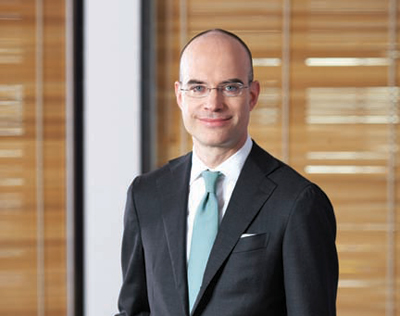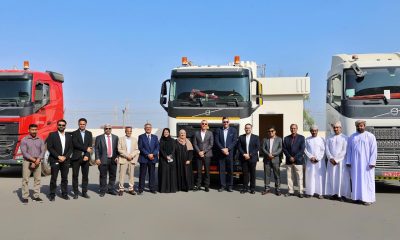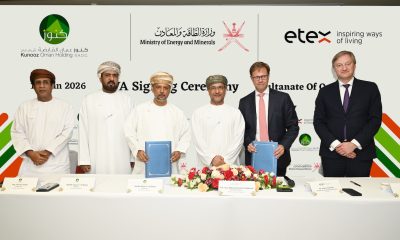Interviews
A paradigm shift
Burkhard P Varnholt, Chief Investment Officer, Bank Sarasin & Co talks to Mayank Singh about the rise of a new economic order and how to negotiate this change.

Burkhard P Varnholt, Chief Investment Officer, Bank Sarasin & Co talks to Mayank Singh about the rise of a new economic order and how to negotiate this change.
What are the big trends in a changing world order that investors need to be aware of while making their choices?
The biggest theme for our investors is that a new world order is emerging. Many people simplify it by describing it as the rise of the East and the decline of the West; that might be happening, but this is not what is driving it. What is driving it is a combination of demographic, technological and scientific, economic, ecological and social change. When you put these five factors together then the real story about this emerging world order becomes clear. It has never been so important to understand the real idea of sustainable development and when I say sustainable development it means preparing your society at a national level, business level and at the individual level for the next 1,000 years and that implies that you just cannot cut corners.
That means you cannot turn a blind eye on factors that have an adverse impact on nature and other social stakeholders. Countries and companies need to run in a first class sustainable way and that is what is going to determine whether the next decade is going to belong to India or to China or to Brazil or Oman. Taking this a step further also means that a new investment paradigm is emerging, because as an investor you need to embrace the future and not run behind it, you need to pick companies and states on the basis of the sustainability criteria – does a company run a sustainable business model while also factorising other fundamentals like whether it is attractively valued etc. That’s the difference between today and ten years ago.
Investors are told to choose from companies spreading across countries and the same holds true for various asset classes. Does this make investing more difficult for a lay investor?
This is one area that we have invested in for the last 20 years providing research, advice and investment solutions for the long term. We invest in companies that invest for the long term and run sustainable businesses. You are right, investing was always difficult and it was always advisable to have a good trustworthy investment advisor; in a new order one requires a different sort of advice. As the investment paradigm changes it is also important that one challenges ones investment advisor on whether he understands this paradigm and whether he can provide the depth and breath for it.
Where should one invest in a new order as there are a lot of contradictory views emanating. Some say that the US is recovering slowly, Eurozone seems to be in crisis, China is slowing down and India has its own set of problems?
The world economy is in a better shape than what people claim that it is. The US is clearly turning around and there is no question about that, China is not in free fall as it is just shifting its growth model from being export-led to being domestic driven. Foxconn has recently had to double salaries for its 500,000 employees; now that will cause some sort of a growth slowdown in the short term, but these 500,000 employees will also go out and buy the iPods that they produce in the medium term. So there are two sides to every story. Europe is following and there is nothing new about that as that has always been the case. When I look at the world I think that all the analysts have been extremely bearish in the beginning of this year, but what I see is that the world economy has never been a perfect place.
This year will be a Goldilocks year for investors because of a combination of factors – an improvement in the economic picture, no increase in interest rates plus you have an enormous wall of liquidity which represents investors’ scepticism, as they say on Wall Street every bull market has to climb the high wall of worry. The wall of worry is the wall of money. So you really have an ideal year in 2012 that favours risk takers and equity investors. The year will end in solid double digit returns for equity investors. In terms of regions, emerging markets are cheaper than the US and they have better growth momentum. Europe is very unloved and that makes it cheaper and also quite attractive. Add to that the sustainability factor when you come down to stock selection and you get a world class portfolio.
What is your take on emerging markets and where do you think countries in the GCC, China, Brazil and India are headed towards?
Oman and the Gulf states are an attractive buying opportunity for both domestic and international investors. The catalysts for strong performance that I anticipate will be high oil prices and a global recovery that translates nicely into the GCC economies and my strong conviction is that the bottom of the real estate market is behind us and that the supply demand imbalances are narrowing. GCC markets have been underperformers compared to other emerging countries but that is one of the reasons why I find them to be attractive; they are at very cheap valuations and the companies which are being traded are very solid, so there are strong growth opportunities.
If one were to talk about sectors then I would pick banks across the GCC region, as they have been the most unloved in the past year and they will benefit most from the turnaround. Apart from this one should be close to the oil and gas sector.
China is not in free fall; the government explained this last year when they put out their five year plan. They are seeking to move towards a new economic model, which has been modelled after Scandinavian countries – one that is very inclusive, a social, free market economy, driven by innovation rather than cheap labour and one that will be based on domestic rather than external demand. It should be clear to everyone that such a shift does not come without friction. As China is facing a period of solid political tension and as it has one of the most powerful Central Banks in the world, the latter will use its full authority to see that the Chinese economy does not tank. It will slow and there will be some collateral damage, but you will see domestic demand picking up.
Brazil is as good as it has ever been; the great potential that Latin America enjoys is that as and when they open up their region to intra-market trade they can multiply their productivity. India is the most promising economy in the world as it has the most entrepreneurial genes, if only it did not have a government that keeps shooting itself in its foot. India is the biggest democracy in the world but it also has more red tape and regulation. When it can firmly deal with them, when it gets there, India will overtake China in terms of growth and GDP.
A lot has been written about commodities and their continuing good run. How should investors approach this market?
Commodities have only one way to go – higher for longer and it is driven by arguments both on the supply and the demand side. Let’s start on the supply side. The great narrative that oil countries like Saudi Arabia and other have put out is that the more you invest in your upstream exploration production infrastructure, the more oil you produce. This has been more of fiction rather than fact, because despite huge investments these countries are producing, not more than what was being produced 10 years ago.
The supply side suffers from a number of bottlenecks in terms of availability or access and the demand side continues to grow and it will continue to grow exponentially, because of demographic and economic growth. Oil prices will go to $150 and above in the next 12 months. Investors are advised to remain invested (at least 10 per cent of their portfolio) in a diversified commodity fund at all times. Gold will go to $2,500 in the next two years as it has become cheaper and thereby more attractive. Gold is not a reflection on inflation but a reflection on fiscal irresponsibility and that is something that will remain with us for the next couple of years as governments in the West muddle their way through the mess that they have got themselves into.
-

 News2 months ago
News2 months agoAI Security Conference 2025 Hosted by Securado Highlights the Changing Cybersecurity Landscape
-

 Insurance2 months ago
Insurance2 months agoSupporting Community Wellness: Liva Insurance Sponsors Muscat Marathon 2026 with Free Health Checkups
-

 Interviews1 month ago
Interviews1 month agoEXCLUSIVE INTERVIEW: TLS Rebranding Marks Strategic Leap Toward Innovation, Sustainability & Growth
-

 Insurance1 month ago
Insurance1 month agoLiva Insurance Supports Community Wellness Through “Experience Oman – Muscat Marathon 2026”
-

 Investment3 weeks ago
Investment3 weeks agoLalan Inaugurates Its First Overseas Manufacturing Facility, Marking Sri Lanka’s First Investment in SOHAR Freezone
-

 Banking & Finance1 month ago
Banking & Finance1 month agoA New Platform for SME Growth: Oman Arab Bank Unveils Tumouhi
-

 Construction4 weeks ago
Construction4 weeks agoInternational Heavy Equipment hosts Open Day at its Refurbished Facility in Sohar Industrial Area
-

 News3 weeks ago
News3 weeks agoKunooz Oman Holding Partners with Belgian company Etex for Local Gypsum-Based Business Development






























You must be logged in to post a comment Login